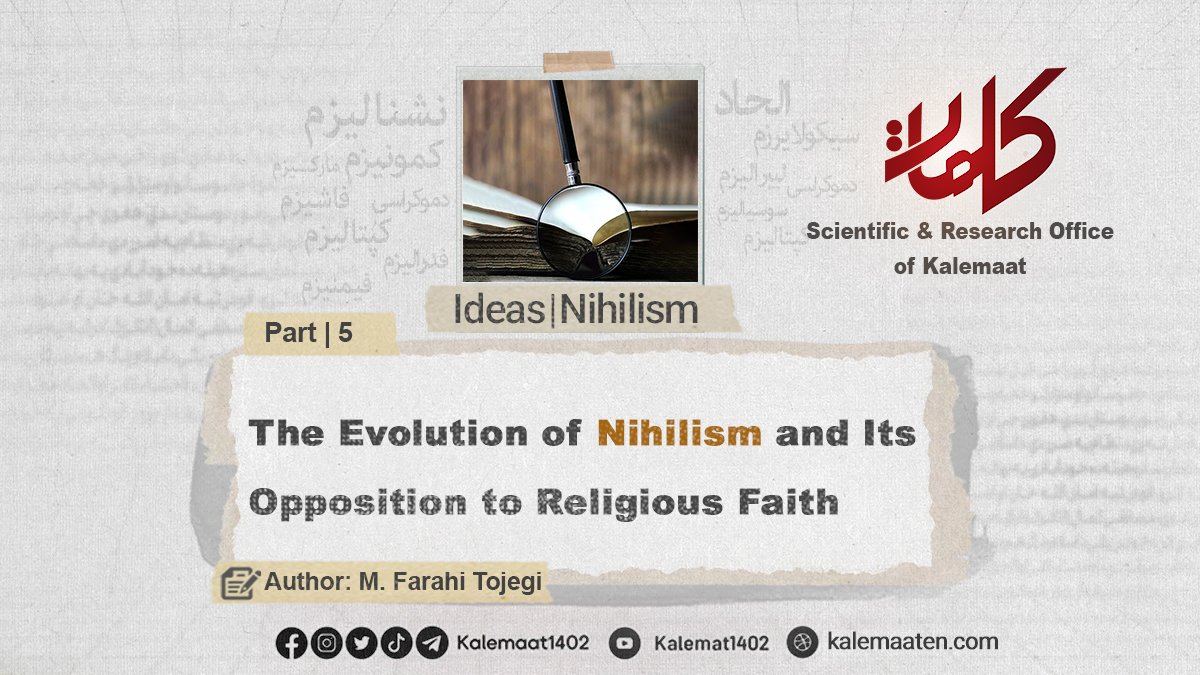Author: M. Farahi Tojegi
The Evolution of Nihilism and Its Opposition to Religious Faith (Part Five)
The Theoretical and Metaphysical Characteristics of a World Influenced by Nietzsche’s Beliefs
According to Nietzsche’s beliefs, the theoretical and metaphysical characteristics of the world are as follows:
-
A world without metaphysics;
-
The absence of ontological security;
-
The death of God;
-
The death of truth;
-
A pragmatic understanding of truth;
-
The death of truth and freedom;
-
The humanization of truth;
-
The negation of the supra-sensory world, the death of eternity;
-
The world as becoming;
-
The denial of metaphysical categories;
-
The world as accident and pure possibility;
-
The de-founding of the world;
-
The world as a mythological category;
-
The world without determinacy;
-
The logic of the emergence of the will-to-power;
-
The production of truth (truth as the product of the will-to-power);
-
The invalidity of (metaphysical) language;
-
The equivalence of literature and philosophy;
-
The death of morality;
-
The absence of any relationship between truth, virtue, and happiness;
-
The world as accident and the mode of life based on it;
-
The death of the human being, which includes:
The reduction of the human to the animal;
b. The death of the subject;
-
Nihilism;
-
The existence of the last human (the human influenced by the above points);
-
Individualism (the invalidation of everything in human existence considered valuable and elevated). [1]
Was Heidegger correct in saying that Nietzsche’s work signifies the completion of metaphysics? In Nietzsche’s philosophical thought, given the form that his philosophical expression takes a series of metaphysical subjects becomes doubtful, unsettled, and problematic; yet despite the form these subjects take, they are never completely annulled, and they remain implicitly embedded within the very terms used for their refutation.
Nietzsche’s ultimate intention was not the destruction of metaphysics but the creation of a new system compatible with the times; however, in this matter as in all of his extensive programs he failed. Although there is no revolution known as the “Nietzschean Revolution,” there is still a new way of looking at the world; both his world and ours and also a new method for describing and interpreting it.
Final Word
It is no exaggeration to say that Nietzsche’s view of all concepts and phenomena is built through the lens of a kind of philosophical pessimism. Nihilism and pessimism form the core of many of his philosophical opinions and even his personal lifestyle. The traces of nihilism are always visible throughout Nietzsche’s philosophy. Nietzsche not only considers metaphysics meaningless, but the power of nihilism within all worldly phenomena has, in a way, become the fundamental presupposition of his philosophy.
In this section of the treatise, although briefly, a portion of Nietzsche’s view seen through the lens of nihilism toward fundamental philosophical issues was presented. However, what is more important is the excessive originality and authority that nihilism holds within his philosophy.
Presenting the theoretical and metaphysical characteristics of a world influenced by Nietzsche’s beliefs does not mean offering a one-sided critique of his philosophy; rather, it is a description of the condition of a world that our contemporary world is grappling with. The result of Nietzsche’s philosophy points toward the prelude of a world he skillfully foresaw. Thus, with the death of meaning, the world continues to fall into a renewed kind of skepticism with characteristics never before encountered in the history of philosophical thought.
Nietzsche attempted by relying on an aspect of the heritage of the nihilistic thought of ancient Greece (an aspect he called Dionysian) to find a path for the salvation of the West. He found this desire and aspiration embodied in a form of Western humanity that he called the “Übermensch” (the overman). This overman desired by Nietzsche is the manifestation and embodiment of the will-to-power, has a nihilistic nature, and naturally stands as a defender of the West and its oppressive nihilistic arrogance.
To be continued…
Previous Part/ Next Part
Reference
- Abdolkarimi, Bijan. The Nietzschean World. Elm Publications, First Edition: 387, p: 93.



